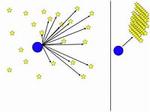About Me
Post-Doc in quantum information and quantum optics, currently developing genetic and machine learning algorithms for the optimization problems. Interested in the foundations of quantum theory such as Entanglement Theory, Bell’s inequalities, and classical explainable models. I also studied metrology, quantum communication games, light-matter interaction in QED and second-order interferometry methods.
Download my research resumé.
Interests
- Light-Matter QED
- Quantum Optics
- Machine Learning
- Quantum Metrology
- Entanglement Theory
- Quantum foundations
- Mathematical Physics
Education
-
PhD in Theoretical Physics, 2021
University of Bari
-
Master degree in Theoretical Physics, 2017
University of Bari
-
BSc in Physics, 2015
University of Bari
Featured Publications
See all publications here.
Teaching
Probability and Statistics
Experience
Academic Teacher
Probability and statistics at the field of study Quantum Information Technology at the Faculty of Mathematics, Physics and Informatics, University of Gdańsk.
Post-Doc
Quantum hacking and fundamental law of Nature in the Quantum Cybersecurity and Communication group led by prof. M. Pawłowski.
Post-Doc
I worked on quantum metrological advantages studying the weak values amplification and cost of postselection in bayesian gambling theory for the Quantum Information Group led by prof. R. Demkowicz-Dobrzanski.
Independent Researcher
I worked on the generalization of CHSH scenario and on contextuality advantages in collaboration with the group of Multiphoton Quantum Optics for Quantum Information Group led by prof. M. Żukowski and the group of Foundational Underpinnings of Quantum Technologies Group led by prof. A. B. Sainz
PhD Student
Research area: second order interferometry of thermal and entangled light, Light-matter interaction in cavity system and the development of XY-criterion for separability problem in Entanglement Theory.
Visiting Scholar
Entanglement witnesses and positive map in the group led by D. Chruściński and G. Sarbicki ; cavity QED in the group led by K. Słowik.
Internship at INFN Sez. Bari
Research area: Correlation Plenoptic Imaging
Awards & Honors
PROM project
I won this intership which has strenghtened my collaboration with the Mathematical Physics group and with the Quantum Optics group in Toruń.
See certificate
TAPS (The Torun Astrophysics / Physics Summer Program),
Contact
- giovanni.scala@ug.edu.pl
- Jana Bażyńskiego 1A, Gdańsk, 80-309




